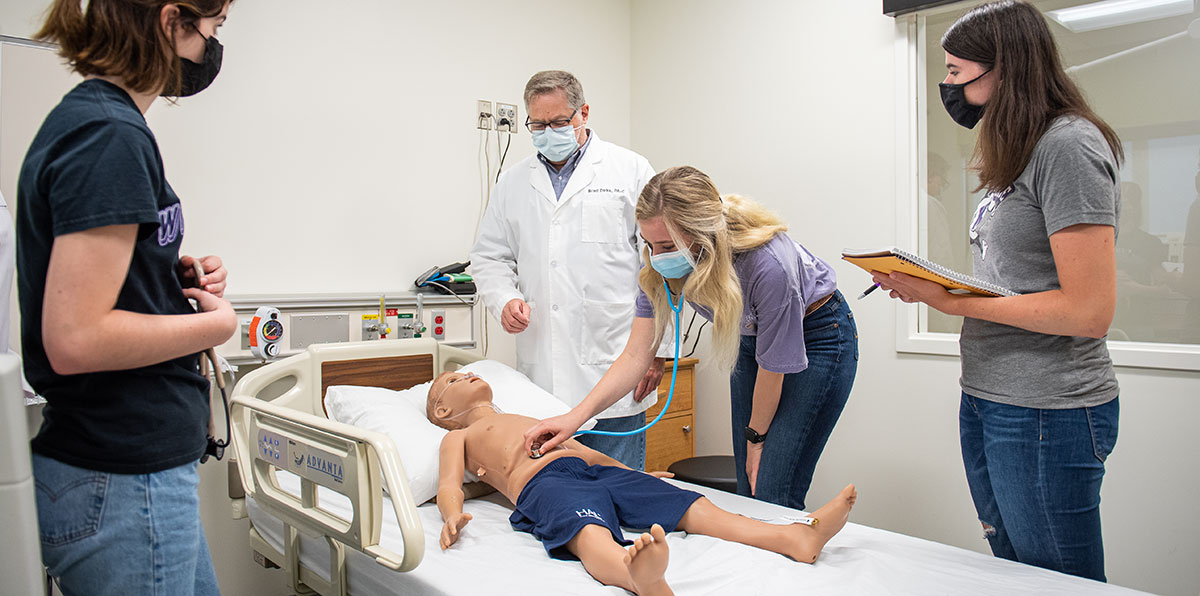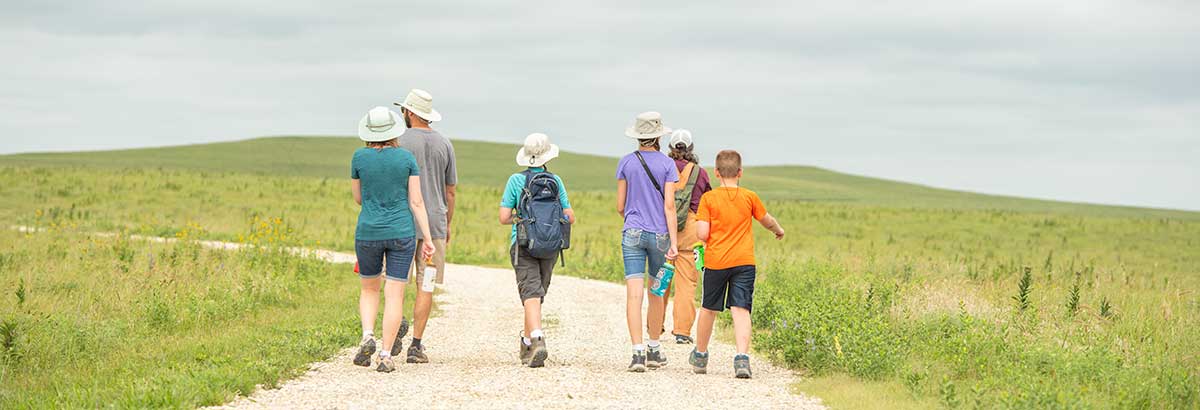Through public health programs, K-State helps communities
The hidden crisis
By Chelsi Medved
As the COVID-19 pandemic has affected communities across the world, it also has amplified long-existing problems in communities at home. A shortage of health care providers. A lack of mental health resources. The need for strong community and public health research initiatives.
Professionals in human health careers have felt the burden. Doctors, nurses and physician assistants provide nonstop health care. Therapists and counselors work overtime to offer mental health support. Researchers, health communicators and epidemiologists deliver data around the clock.
Kansas State University is addressing this often-hidden crisis in public health and community health. University leaders are creating new academic programs to provide more health-focused professionals. Researchers are tackling multiple topics related to public health.
“The COVID-19 pandemic has strained our health care system and scientific communities,” said Brad Behnke, associate dean of research and graduate studies for the College of Health and Human Sciences. “Yet both health care providers and scientists rapidly combated the multiple insults of the disease to meet patient demands. Public health research is crucial to collect and disseminate accurate information to combat the immediate and longterm impact of this disease. At K-State, we are fortunate to have not only a multitude of public health experts, but also undergraduate and graduate programs in public health to train and equip the next generation of experts.”
Read the following highlights of interdisciplinary health-related projects that are helping communities during the COVID-19 pandemic and preparing us for a post-pandemic world.
Mindfulness in the hospitality industry
A K-State researcher and collaborators are studying how mindfulness in the workplace can help hospitality employees cope with daily stress on the job and increase engagement at work.
The success of hospitality firms — such as restaurants, hotels, casinos and event centers — depends largely on the quality of frontline employees who generate and maintain positive relationships with customers.
But the hospitality industry working environment is characterized by long hours, low job security, low pay and emotional demands. It can be even more stressful when confronting difficult customers.
In a study with casino employees in South Korea, Jichul Jang, K-State associate professor of hospitality management, and two international collaborators found that more mindful employees are able to cope with customer incivility and maintain their level of work engagement. The research suggests that mindfulness training programs, such as meditation, have improved employees’ mental health by reducing their perceived level of stress.
Organizational support is key, the researchers said. To see long-lasting effects of mindfulness, hospitality firms can make resources readily available to employees by setting up a quiet room for mindfulness practice, by including practice time as part of the work shift or by offering group sessions with certified trainers.
Helping the shortage of health care workers

For years, K-State has offered the interdisciplinary Master of Public Health program to prepare individuals to address health issues on local, state, national and international levels.
“K-State has been training graduate students in public health since 2003,” said Ellyn Mulcahy, director of the Master of Public Health program and associate professor in the College of Veterinary Medicine. “We have prepared our graduates for careers in public health ranging from local health departments in Kansas to federal and international public health agencies. Our new programming in online graduate public health combined with the new undergraduate programs focused on public health places us in an exceptional position to provide access to excellent public health education for K-Staters and impact public health globally.”
To address state and national shortages of health care workers, K-State continues to develop new programs to prepare students for health careers.
The College of Health and Human Sciences has created two new programs for nurses and physician assistants. The Pathway to Nursing Program will begin in fall 2022 in collaboration with Wichita State University and will allow students to pursue a nursing bachelor’s degree and a K-State bachelor’s degree while on the K-State Manhattan campus.
The Master of Science in physician assistant studies program — set to begin in January 2022 — will prepare students to be nationally certified and licensed medical professionals who work on health care teams with physicians and other providers. Their jobs will be in demand, too: The Bureau of Labor Statistics projects a 31% increase in physician assistant jobs by 2026, compared to a 4% increase in physician jobs.
Improving care environments
Migette Kaup, K-State professor of interior design, and co-investigator Margaret Calkins of the IDEAS Institute are using a National Institutes of Health grant to improve living environments for individuals with dementia and other older adults who live in planned care settings.
The researchers are validating the Environmental Audit Screening Evaluation, or EASE, tool, which assesses elements of household design in skilled care settings, such as nursing homes. The assessment tool connects to evidence-based design research and relates to clinical care and behavioral health outcomes.
“This research addresses limitations of existing assessment instruments by identifying which elements of nursing home environments can be planned for or improved to support the desired specific outcomes for residents, staff and organizations,” Kaup said.
The researchers also are contributing to knowledge on health and interior design. They have received COVID-19 supplemental funding from NIH to collect environmental and operational data on variables associated with potential transmission of infections.
Park prescriptions for mental health

Almost 1 in 5 adults, or 46.6 million Americans, live with a mental illness, according to the Substance Abuse and Mental Health Services Administration. During the pandemic many people have struggled with mental health issues, such as anxiety, depression and chronic stress.
But what if a prescription for a mental illness involved a visit to your neighborhood park?
Both physical activity and time in nature can improve mental health, and several K-State researchers are developing a training intervention that helps mental health practitioners promote nature-based physical activity as part of clients’ treatment plans.
The project involves kinesiology researchers Emily Mailey, associate professor, and Gina Besenyi, assistant professor, as well as Jared Durtschi, associate professor in couple and family therapy.
“Outdoor physical activity can increase energy and self-esteem, and reduce tension, anger, anxiety and depression,” Besenyi said. “Given the many benefits, researchers and practitioners acknowledge physical activity is an integral component of mental health treatment and recovery, but what we need are evidence based, scalable interventions.”
The researchers worked with therapists across the U.S. — including K-State Counseling and Psychological Services and the couple and family therapy program practitioners at the university — and found that mental health practitioners are receptive to the idea of delivering “park prescriptions,” but want further training to feel comfortable recommending physical activity to clients.
The researchers continue to study clients’ perspectives on park prescriptions and to develop preliminary training for mental health practitioners.
“We hope to shine a light on parks as valuable and affordable physical activity and public health resources that can expand mental health services’ capacity and reach to prevent and treat mental health disorders,” Besenyi said.
Educating for healthy communities

Lisa Ross, Master of Public Health student, is helping nutrition educators across the state engage with communities and partners.
Ross recently evaluated a professional development course for Supplemental Nutrition Assistance Program Education, or SNAP-Ed, staff. Kansas SNAP-Ed — managed by K-State Research and Extension — supports low-income Kansans in making healthy choices. Ross serves as the Kansas SNAP-ED coordinator.
Ross’ research shows that participants who completed the course felt more comfortable and better with the skills needed to engage in the SNAP-Ed policy, system and environment approaches within their communities.
“The evaluation showed that the course was successful in teaching public health professionals how to think, see and do effective systems-level change work,” Ross said. “Because of these great results, Kansas will be providing this training to all state SNAP-Ed staff.”
New academic programs for health careers
Several Kansas State University colleges — including Health and Human Sciences, Arts and Sciences, and Veterinary Medicine — have created new academic tracks for health care professionals. These new programs include:
- Pathway to Nursing Program, a bachelor’s degree collaboration with Wichita State University.
- Master’s degree in physician assistant studies.
- Master’s degree in athletic training.
- Bachelor’s degree in integrative physiology.
- Bachelor’s degree in public health.
- Bachelor’s degree in biology with new specializations in human health biology and medical microbiology.
- Integrated health studies secondary major.
- Global health, medicine and society certificate program.
- One-year graduate program in biomedical science.
- Online Master of Public Health degree.
- Online bachelor’s degree in kinesiology.